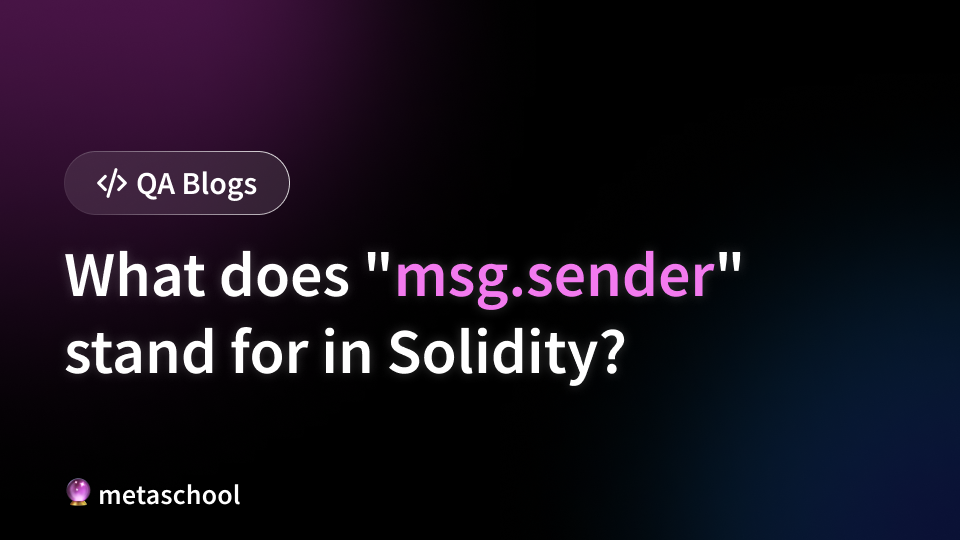Solidity msg.sender Explained: Understanding the Basics
Learn how "msg.sender" works in Solidity and why it's crucial for building secure and interactive decentralized applications.
Learn how "msg.sender" works in Solidity and why it's crucial for building secure and interactive decentralized applications.
In the world of Solidity, smart contracts reign supreme, and understanding how they interact with the outside world is crucial. One of the fundamental concepts you'll encounter is msg.sender. This special keyword acts as a digital identifier, always pointing to the address that initiated a function call within your contract.
msg.sender is a special keyword in Solidity that always refers to the address that initiated a contract function call.
Think of it like this: whenever someone interacts with your smart contract, they send a message. msg.sender tells you who sent that message.
Here's why it's important:
msg.sender to control who has access to certain functions or data in your contract. For example, you might have a function that only the contract owner can call:function onlyOwner() public {
require(msg.sender == owner);
// ... function logic ...
}Tracking: You can use msg.sender to keep track of who is interacting with your contract and how. This can be useful for things like auditing or analytics.
Personalization: You can use msg.sender to personalize the behavior of your contract based on who is calling it. For example, you might have a game where the rules change depending on the player.
It's important to remember that msg.sender is not always the same as the person who originally deployed the contract. If a contract function is called by another contract, msg.sender will be the address of that contract, not the user who initiated the transaction.
This text provides examples of how to use msg.sender in Solidity for access control, tracking interactions, and dynamic behavior. It explains how msg.sender represents the address of the function caller and demonstrates its use in restricting function access, recording interaction history, and customizing contract logic based on the caller. The examples highlight the importance of msg.sender in building secure and personalized smart contracts.
Here are some code examples to illustrate the use of msg.sender in Solidity:
1. Access Control:
This example demonstrates how to restrict access to a function only to the contract owner:
pragma solidity ^0.8.0;
contract MyContract {
address public owner;
constructor() {
owner = msg.sender; // Set the contract deployer as the owner
}
modifier onlyOwner() {
require(msg.sender == owner, "Only the owner can call this function.");
_;
}
function withdrawFunds() public onlyOwner {
// Only the owner can withdraw funds
payable(owner).transfer(address(this).balance);
}
}Explanation:
owner variable stores the address of the contract owner.constructor function is executed only once when the contract is deployed and sets the owner to msg.sender (the deployer).onlyOwner modifier restricts access to the withdrawFunds function. It uses require to check if msg.sender matches the owner address. If not, it throws an error.withdrawFunds function can only be called by the owner and allows them to withdraw the contract's balance.2. Tracking Interactions:
This example shows how to track the addresses that have called a specific function:
pragma solidity ^0.8.0;
contract InteractionTracker {
mapping(address => bool) public hasInteracted;
function interact() public {
hasInteracted[msg.sender] = true;
// ... other function logic ...
}
}Explanation:
hasInteracted mapping stores a boolean value for each address, indicating whether they have called the interact function.interact is called, it sets the value for msg.sender in the hasInteracted mapping to true.3. Dynamic Behavior:
This example demonstrates how to personalize contract behavior based on the caller:
pragma solidity ^0.8.0;
contract PersonalizedGame {
mapping(address => uint256) public playerScores;
function play() public {
if (playerScores[msg.sender] == 0) {
// New player, give them bonus points
playerScores[msg.sender] += 10;
}
// ... other game logic ...
}
}Explanation:
playerScores mapping stores the score for each player.play function checks if the caller is a new player (score is 0). If so, it gives them bonus points.These are just a few examples of how msg.sender can be used in Solidity. It's a powerful tool for building secure, transparent, and personalized smart contracts. Remember that understanding its nuances, especially when other contracts are involved, is crucial for writing secure and reliable code.
msg.sender helps control access based on the calling address, it's not a replacement for robust user authentication. Remember that externally owned accounts (EOAs) can be compromised.msg.sender and potentially granting them unintended access.msg.sender in complex logic or within loops can increase gas costs. Be mindful of its impact on the overall gas efficiency of your contract.msg.sender: In some cases, alternative patterns like signature verification or meta-transactions might be more suitable for managing access control and user interactions, especially when dealing with off-chain components or more complex authorization schemes.msg.sender is used. Its meaning can change depending on whether the function is called directly by a user, another contract, or within the same contract.By understanding these nuances and potential pitfalls, developers can leverage msg.sender effectively to build secure and reliable smart contracts.
| Feature | Description |
|---|---|
| What it is | A special keyword that identifies the address that initiated a contract function call. |
| Analogy | Like a return address on an envelope, telling you who sent the message to your contract. |
| Importance | * Security: Control access to functions and data based on the caller. * Tracking: Monitor contract interactions for auditing and analytics. * Personalization: Tailor contract behavior based on the user. |
| Example |
require(msg.sender == owner); ensures only the contract owner can execute the function. |
| Important Note |
msg.sender reflects the immediate caller, which may be another contract and not the original user. |
In conclusion, msg.sender is a fundamental concept in Solidity, providing a powerful tool for developers to build secure, transparent, and interactive smart contracts. By understanding how to leverage msg.sender effectively, developers can control access to contract functions, track interactions, and personalize user experiences. However, it's crucial to be aware of its limitations and potential security implications, especially in the context of complex interactions and potential vulnerabilities like phishing attacks. When used appropriately and with a thorough understanding of its nuances, msg.sender empowers developers to harness the full potential of smart contracts in a secure and reliable manner.
 What Does “msg.sender” Stand for in Solidity? - | msg.sender represents the address of the account that calls the function present within the Solidity smart contract.
What Does “msg.sender” Stand for in Solidity? - | msg.sender represents the address of the account that calls the function present within the Solidity smart contract. Introduction to Smart Contracts — Solidity 0.8.29 documentation | Basics. Introduction to Smart Contracts. A ... msg.sender; } // Sends an amount of newly created ... Blockchain Basics . Blockchains as a concept are ...
Introduction to Smart Contracts — Solidity 0.8.29 documentation | Basics. Introduction to Smart Contracts. A ... msg.sender; } // Sends an amount of newly created ... Blockchain Basics . Blockchains as a concept are ... Solidity for Beginners · Smart Contract Development Crash Course ... | Today I'm going to show you how to get started programming with the Solidity so that you can become a blockchain developer. I'll show you how to write your first Ethereum smart contracts with Solidity as a beginner! You don't have know anything about the language to get started with this tutorial. We'll even do all the programming inside your web browser so you won't have install any development tools or anything like that.
Solidity for Beginners · Smart Contract Development Crash Course ... | Today I'm going to show you how to get started programming with the Solidity so that you can become a blockchain developer. I'll show you how to write your first Ethereum smart contracts with Solidity as a beginner! You don't have know anything about the language to get started with this tutorial. We'll even do all the programming inside your web browser so you won't have install any development tools or anything like that. blockchain Introduction | Solidity Introduction Table of Content:
Solidity Introduction Prerequisite First Smart Contract Deploy your Smart Contract Blockchain Network Solidity Basics- Variables Mapping and Structs Deposit and withdraw Smart Contract Life-cycle Complex Examples - Map and Struct Known Facts Exception Handling Add a Require Add an Assert Difference between require and assert Try/Catch Prerequisite Remix IDE - https://remix.ethereum.org/ MetaMax Setup First Smart Contract // SPDX-License-Identifier: GPL-3.0 pragma solidity ^0.8.1; contract Contract01 { string public myString = "hello world"; } Note: ‘public’ will generate automatic getter
blockchain Introduction | Solidity Introduction Table of Content:
Solidity Introduction Prerequisite First Smart Contract Deploy your Smart Contract Blockchain Network Solidity Basics- Variables Mapping and Structs Deposit and withdraw Smart Contract Life-cycle Complex Examples - Map and Struct Known Facts Exception Handling Add a Require Add an Assert Difference between require and assert Try/Catch Prerequisite Remix IDE - https://remix.ethereum.org/ MetaMax Setup First Smart Contract // SPDX-License-Identifier: GPL-3.0 pragma solidity ^0.8.1; contract Contract01 { string public myString = "hello world"; } Note: ‘public’ will generate automatic getter Solidity and Rust Syntax, Data Types, and Basic Constructs | Stellar ... | Explore the fundamentals of Solidity and Rust Syntax, Data Types, and Basic Constructs.
Solidity and Rust Syntax, Data Types, and Basic Constructs | Stellar ... | Explore the fundamentals of Solidity and Rust Syntax, Data Types, and Basic Constructs. Cyfrin Code Glossary: Delegatecall in Solidity | Solidity code example of
Cyfrin Code Glossary: Delegatecall in Solidity | Solidity code example of delegatecall, a low level function similar to call. My Coding Journey: From Finance to Smart Contract Auditor - Page ... | Day 10 (delayed post due to poor internet): Unit testing was more difficult than expected. I feel I haven't made much progress since yesterday because I am unsure how to use the slither VSCode extension (or maybe I am using it right?). I've run the extension on basic smart contracts and aside from "Error: Error in workspace "[my github remote repo name]" the results come back with no further error. While I read further documentation and watch a few YouTube videos to get a better understanding o...
My Coding Journey: From Finance to Smart Contract Auditor - Page ... | Day 10 (delayed post due to poor internet): Unit testing was more difficult than expected. I feel I haven't made much progress since yesterday because I am unsure how to use the slither VSCode extension (or maybe I am using it right?). I've run the extension on basic smart contracts and aside from "Error: Error in workspace "[my github remote repo name]" the results come back with no further error. While I read further documentation and watch a few YouTube videos to get a better understanding o... Cyfrin Code Glossary: Call in Solidity | Solidity code example of
Cyfrin Code Glossary: Call in Solidity | Solidity code example of call, a low level function to interact with other smart contracts.